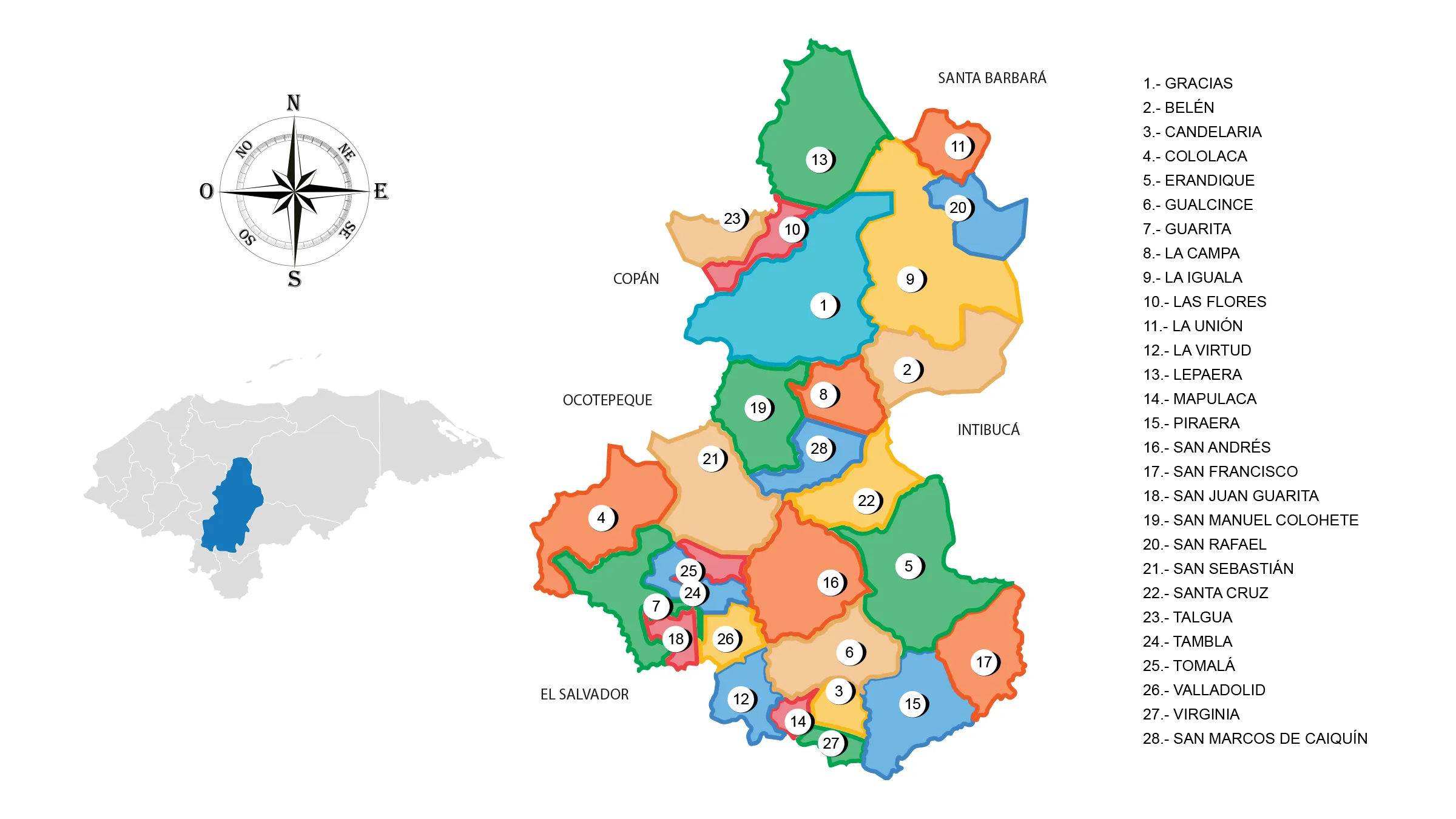Department of Lempira

Lempira is a department of the Republic of Honduras.
View Map of Department of Lempira
Origin of its name: as a tribute to the Lenca cacique, Lempira who defended territoriality against the Spanish conquest.
Important facts about Lempira
Department Head: Thank you
Land surface: 4228 km2
Administrative Code: 13
Population: 323,520 inhabitants (2011)
Population density: 77 inhab/km2
Date Created: June 28, 1825
History of Lempira
Lempira was founded on June 28, 1825. Previously, this department belonged to the territory of Gracias as part of the first territorial organization of Honduras in 1536. The name of the department is a tribute to the indigenous hero Lempira who originated from this place.
The first settlers arrived like the other inhabitants of the American continent in various migrations, settling in western Honduras and considering the Lenca ethnic group as the most numerous and extensive in that area of the territory. At the time of contact, the records of the Spanish chroniclers located them in the geopolitical territoriality of the province of Cerquín.
The Lenca group was subdivided into Lenca Lenca, Lenca Potón, Lenca Care and Lenca Cerquín; The members of this last subgroup led the resistance in the Spanish conquest process where the indigenous cacique Lempira stood out, who, like other indigenous chiefs such as Cicumba, Socremba and Copán Galel, resisted the conquest process in colonial Honduras, in honor of This Lenca warrior is given the name of the department, whose antecedents go back to the department of Gracias, created on June 28, 1825 in the first division of the departments of the state of Honduras.
In 1943, by means of a legislative decree, the name of Gracias was changed to that of Lempira.
Geography of Lempira
The department of Lempira has an area of 4,228 square kilometers and is located in western Honduras.
- North: Department of Santa Barbara
- South: Republic of El Salvador
- East: Department of Intibucá
- West: Departments of Copán and Ocotepeque.
Municipalities of Lempira
See List of Municipalities of Honduras
- Gracias 1301 Cabecera Departamental
- Belén 1302
- Candelaria 1303
- Cololaca 1304
- Erandique 1305
- Gualcince 1306
- Guarita 1307
- La Campa 1308
- La Iguala 1309
- Las Flores 1310
- La Unión 1311
- La Virtud 1312
- Lepaera 1313
- Mapulaca 1314
- Piraera 1315
- San Andrés 1316
- San Francisco 1317
- San Juan Guarita 1318
- San Manuel Colohete 1319
- San Rafael 1320
- San Sebastián 1321
- Santa Cruz 1322
- Talgua 1323
- Tambla 1324
- Tomalá 1325
- Valladolid 1326
- Virginia 1327
- San Marcos de Caiquín 1328
Rivers: Tejocote, Higuito, Jicatuyo, Curicunque, Conchagua, Cuacamara, Campuca, Oromilaca, Arsilaca, Arcagual, Mocal, Guarajambala.
Protected areas: National Park, Celaque; wildlife refuge, Puca and Montaña Verde.
Mountains: Puca Opalaca, Celaque.
Mountains: Puca, Joconal Cololaca, El Sirin, Guarilaca, Cedros Verde, Ojuera, Agua Fria, Peleo, Lempira, Azacualpa, Congolón, Cerros Coyucutena and Cerquin.
Fauna and Flora of Lempira
Mammals: shrew, squirrel, coatis, guazalo, skunk, raccoon, deer, tepezcuintle, bob pig, coyote, fox, wild cat, puma, ocelot, and jaguar.
Avijauna: woodpecker, oak pheasant, ocotera pigeon, roadrunner or dog soul, magpie, grackle, quail, torcasa, parakeet, tarragon or guardabarranco, mockingbird, goldfinch, hawk, bearded vulture, owl and osprey.
Flora: Forests of pine, fir, oak, cedar, mahogany, and broadleaf forest.
Economy of Lempira
Business: Thank you, Las Flores and Lepaera
The economy of the department of Lempira is based on agriculture. coffee, corn, rice, tobacco are among other products; fundamental part of the daily activities of this department.
Cultivation of basic grains, coffee, sugar cane and plantain; raising cattle, horses, pigs and sheep.
Lempira Tourism
- Hot springs of Gracias
- Festival Convoca
- Festival of the Choro


